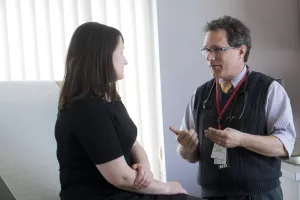You are so much more than a cancer diagnosis. From proactively taking your health into your own hands with cancer screenings and genetic risk assessments, to challenging cancer with medical innovations and the support of an entire care team, you can trust that Tufts Medicine will go the extra mile in your care journey.
Why you should trust Tufts Medicine with your cancer care
Our story begins in the 1940s when we first treated people living with cancer. Since then, a lot has changed — research, clinical trials, testing methods and groundbreaking treatment therapies. But one thing that hasn’t changed is our belief that everyone deserves care tailored to their needs.
We back up that belief with the latest cancer treatment innovations, like incision-free brain surgery or a procedure that removes breast tumors and reconstructs the breast at the same time. And since there's more to cancer than just the physical effects, we focus on treating your whole well-being with support groups and dedicated social workers.

Conditions
We treat the full spectrum of cancers, including:
- Amyloidosis
- Benign blood disorders
- Bladder cancer
- Breast cancer
- Cardio-oncology
- Colorectal cancer
- Esophageal cancer
- Gastric cancer
- Gastrointestinal cancer
- Genitourinary cancer
- Gynecologic cancer
- Head and neck cancer
- Hematologic malignancies
- Kidney cancer
- Leukemia
- Liver + biliary cancer
- Lymphedema
- Lymphoma
- Melanoma
- Multiple myeloma
- Neuro-oncology
- Pancreatic cancer
- Pediatric hematology + oncology
- Peritoneal surface malignancy (PSM)
- Skin cancer
- Thoracic cancer
- Urologic cancer
Testing
Everyone’s journey to better health starts with a thorough evaluation. Diagnostic tests highlight important details about your health, such as detecting and confirming a cancer diagnosis, tracking your treatment's effectiveness and verifying if cancer is in remission.
We work with our colleagues in radiology to provide complete testing services. Depending on the suspected type of cancer and its location, they may select one or more of the following diagnostic procedures:
- Biopsy
- Blood test
- Bone marrow biopsy or aspiration
- Colonoscopy
- Echocardiogram
- Genetic testing
- Laboratory services
- Mammography
- Magnetic resonance imaging (MRI)
- Nuclear medicine
- Pap tests
- PET/CT scan
- Positron emission tomography (PET)
- Ultrasound
- X-ray
Cancer screening
Cancer screenings can identify cancer at its earliest stage, which is when it is most treatable. As many as 30–50% of cancer cases can be prevented with simple efforts, such as lifestyle changes and cancer screenings.
Common cancer screenings include:
- 3D mammography
- Breast MRIs
- Clinical breast exams
- Colonoscopy
- Human papillomavirus (HPV) tests
- Low-dose CT scans for lung cancer
- Pap tests
- Prostate cancer screenings
- Skin cancer screenings
- Transvaginal ultrasounds
These tests can even help your doctor identify abnormalities before they become cancerous and cause symptoms. Screenings are especially important if you have a family history of cancer. Your primary care doctor will let you know when it’s time for a screening.
Genetic risk assessment
Genes are DNA sequences passed down from parents. They influence traits like hair color and height and can also make people more likely to develop certain cancers.
With a genetic risk assessment, you can learn if you have any hereditary cancer syndromes like hereditary breast and ovarian cancer syndrome (HBOC) and Lynch syndrome.
If we find that you have any gene mutations linked to cancer, we’ll help you take preventive measures to minimize your risks and live your healthiest life.
Treatments
We offer the latest procedures and treatment options for cancer, including:
- Access to clinical trials
- Biologics
- Biotherapy
- Bone marrow transplant
- Cardio-oncology
- Chemotherapy
- Hyperbaric oxygen therapy (HBO)
- Immunotherapy
- Infusion services
- Oral oncolytics
- Physical therapy
- Precision medicine and cancer
- Radiation oncology
- Stem cell transplant
- Surgery
- Wound healing medicine
Additional programs and opportunities that are designed to provide you with the best possible support throughout your cancer treatment and survivorship journey:
Our Adolescent + Young Adult (AYA) Cancer Program helps individuals aged 18-39 navigate life after cancer treatment.
With experimental therapeutics, doctors and researchers work side-by-side with laboratory scientists to create the latest therapies and most promising clinical trials.
We focus our research efforts on:
- Offering treatments to people with tumors that haven't responded to standard drugs
- Developing new drugs to treat cancer more effectively and with fewer complications
- Understanding the biology of cancer and how drug treatments work
- Creating practices for better diagnosis and more accurate prognosis
Good nutrition is an important component of your cancer treatment. Eating the right kinds of foods before, during and after cancer treatment will help you feel better, stay stronger and navigate the side effects of cancer treatment.
Nutrition therapy is used to:
- Help you get the nutrients you need to maintain body weight and strength
- Replace and keep body tissues healthy
- Fight infection
Reiki therapy is an alternative medicine that channels energy to promote healing, provide relaxation, promote balance and improve one's sense of well-being. Reiki sessions may help manage symptoms and side effects of chemotherapy and other medications, as well as improve health challenges such as anxiety, pain, fatigue and insomnia.
By integrating Reiki therapy and other complementary holistic services into your traditional cancer treatments, we can provide a more well-rounded healing experience.
While chemotherapy is a very important part of many cancer treatment plans, it can lead to hair loss. Scalp cooling helps prevent or minimize the damaging effects of chemotherapy on hair follicles by lowering the scalp's temperature immediately before, during and after chemotherapy treatment.
One scalp cooling system we use is called the Paxman Scalp Cooling System. The Paxman is a helmet-like cap that snugly fits on a person's head. As it's worn, the Paxman circulates cooling fluid through the cap to lower the scalp's temperature during treatments.
You should never feel alone or unsupported at any point throughout your cancer journey. Our range of support services offer encouragement before, during and after your treatments, including:
- Family therapy
- Genetic counseling and familial risk assessments
- Individual therapy
- Nutrition counseling
- Palliative care
- Physical therapy
- Social work support
- Support groups (ask your care team for information)
- Visiting nurse home care
There are more than 15.5 million cancer survivors in the United States. Our survivorship program offers a lifelong support system to people who have completed active cancer treatment. We’ll help smooth your transition from treatment to life after cancer by offering medical and wellness care, such as:
- Caring for your mental and emotional health
- Establishing a healthy and nutritious diet
- Maintaining recommended follow-up care, such as regular check-ups with your oncologist
- Making connections with cancer support groups
- Managing physical changes and side effects of treatment
- Monitoring, detecting and preventing new or recurrent cancers
Awards + accreditations
Our cancer care has been recognized for quality and safety. So when it comes to making one of the most important decisions of your life, you can be sure you’re in the best of hands.
- National Accreditation Program for Breast Centers (NAPBC)
- American College of Radiology (ACR) - Designated Lung Cancer Screening Center
- Commission on Cancer (CoC) of the American College of Surgeons - Comprehensive Community Cancer Program and
- Outstanding Achievement Award
- American College of Radiology (ACR) - High Practice Standards, Radiation Oncology

From regular office visits to inpatient stays, find the healthcare you need and deserve close to home.

Meet the doctors and care team devoted to supporting you every step of the way along your path to better health.